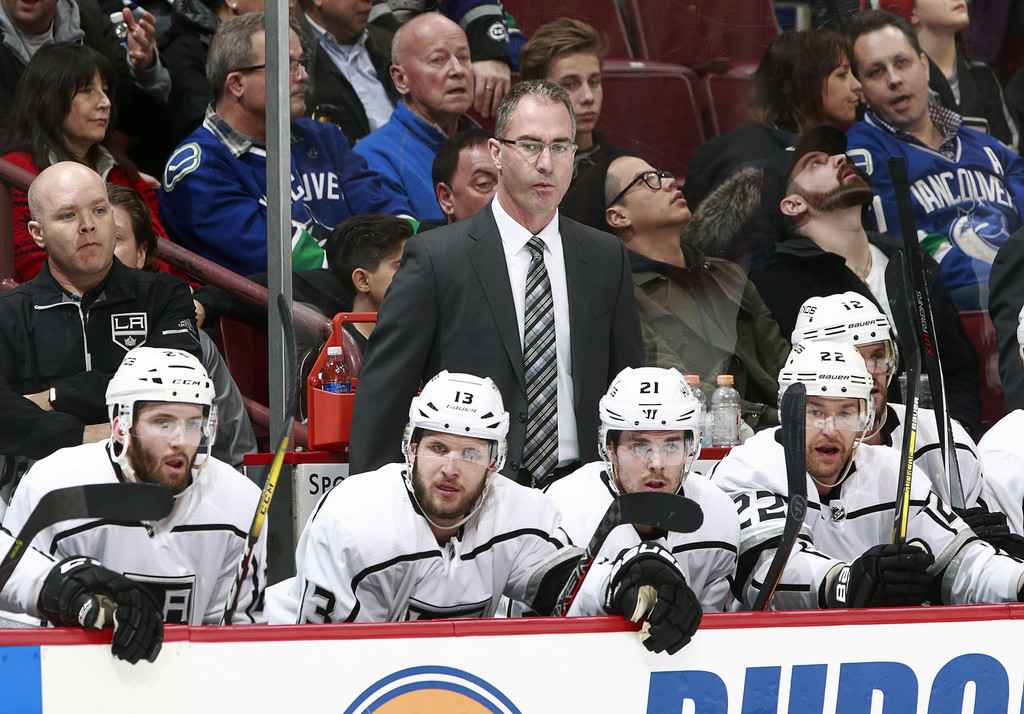January 8, 2018 | 1:17pm ET
BY Dennis Bernstein, The Fourth Period
SLIDING INTO THE BYE WEEK LIKE...
LOS ANGELES, CA -- As the calendar turned to a New Year, I examined how to maximum the enjoyment of the best fans in sports and I’m counting you among them. Highlights reel goals and amazing saves aside, everything in professional hockey starts and end with you.
We have a nice suite of content to offer the fans: a website that has been around for well over a decade and two hours of weekly radio with my partner, Dave Pagnotta, and Nick Alberga with “Off The Rush” on SiriusXM NHL Network Radio on Saturdays from 11AM to 1PM Eastern (and shame on you if you’re not already aware and listening.) Individually, I partner with Josh Brewster on the DJ HockeyTalk podcast, available on iTunes; it’s a lighthearted look at all things NHL that we crank out weekly.
With a sports media landscape that seems to evolve daily and with the realization that you can’t be all things to all people, it’s a matter of focus. The competition is hot and heavy for eyeballs, so the scope of what we’ll explore in 2018 looks like this:
- You can always come to TFP for trade rumours and speculation; it’s what our reputation has been built around. I’m very active answering questions on social media about all 31 teams, their needs and direction. Dave is not quite as active as I am, but his contacts are well-placed and informed.
- Individually, Los Angeles is TFP’s second largest U.S. market and towards that end my plan is to give my take on the Kings (trends, analysis, etc.) three times a month with the fourth week being a league-wide look.
That’s the plan, so let’s activate it.
The Kings slid into their bye week Sunday with two-game losing streak that demonstrated they could use five days away from the rink. The team has exceeded expectations, but the last five periods of hockey showed weariness more mental than physical.
They were on the cusp of a terrific road trip when that inexplicable, ugly second period in Calgary materialized and created a crater they could not dig out of. One of the underplayed strengths of coach John Stevens is his ability to get immediate rebounds from the team after a performance that lacked the attention to detail/smart decision-making regardless of the result, a clear sign of engagement between coach and team.
The Nashville game was a rare occurrence where the Kings did not respond off a sloppy loss with a crisp, sharp performance. Maybe it was the fact they had one eye on the golf course or the beach, and missing Jake Muzzin was impactful. The effort was one where stats don’t tell the whole story; the Predators only posted 20 shots on goal, but they pressured the Muzzin-less defense into turnovers and drew minors all night that prevented the Kings from building momentum. Though the teams have never met in a playoff round and only face each other three times a season, Nashville gets under Los Angeles’ skin more than the average non-rival and when they do eventually meet in the post-season (maybe this one, and if so, think it would be a long and bitter series) it stands to be one of the classics.
The Kings will need to be refreshed coming out of the bye and should not have any motivational issues when facing the arch-rival Anaheim Ducks on Saturday night. Anaheim will have no problem getting ready for this one, either; they’ve dropped the first two games between the teams this season and had their own Calgary disaster on Saturday, forgetting to play defense in the final minute of regulation and losing 3-2 after a stirring third period rally.
The Ducks are finally getting back to close to full health, as Ryan Kesler and Corey Perry have returned to action (a call out on Kesler’s health going forward – a prolonged absence in the middle of the Calgary loss, returning to action in the third, but coach Randy Carlyle noted “he’s nursing an injury and played a lot of hockey” – he’s played six games this season) so expect some good after-the-whistle action.
The Anaheim game is the continuation of an important four-game home stand (yes, they’re all important) because of how the schedule lays up until mid-February. After the Ducks waddle out of Staples Center, the Sharks and Penguins roll in behind them, after a return bus ride to Anaheim and a visit by the New York Rangers, the strength of schedule goes straight up.
Starting with a visit to Vancouver on Jan. 21, Los Angeles plays 11 of 13 on the road, a very rough stretch even when you factor in their solid play on the road this season. Short of a prolonged losing streak at some point inside the trip, there will be no ‘must-win’ games but what this stretch will likely reveal is what standings position the Kings will be competing for down the post-trade deadline stretch.
I don’t know why, but there are still Vegas Golden Knights doubters – all they’ve done is extend their lead in the division over the past month. While I’m not picking them to win the Stanley Cup, as Game 83 is a very different brand of hockey than the first 82, short of all four wheels fall off the wagon and they possess no spare tires, Vegas will be in contention for the Pacific crown. The Golden Knights have a similar road challenge coming, nine of 11 on the road starting in Nashville on Jan. 16 so they may not create more space between themselves and Los Angeles, but if they do, the Kings focus may flip to being just one of the eight qualifiers in the Western Conference.
MVP... MVP... MVP
Since we’re halfway home, I’ll offer up a half-season award with my choice for the Kings MVP.
Statistically, it’s hard to not give the honor to Anze Kopitar; he’s on track to slightly surpass his career high (a recurring theme this season) of 81 points and he continues to produce without Jeff Carter in the lineup as a second offensive threat at center. He’s galvanized Dustin Brown into a Comeback Player of the Year candidate and you can never underestimate his defensive play. Take a random game and focus on the subtleties of his defensive play and you’ll realize that he is irreplaceable as one of the best 200-foot players in the game.
Emotionally, this season’s MVP is Jonathan Quick, the true backbone of this team. As good as his statistics are this season, you can throw them out when you assess his value, the warrior mentality that he brings every night is something the Kings lacked during his 65-game absence and was a major factor in a forgettable 2016 -17 season.
I doubt he is your Vezina winner, as Tampa Bay’s Andrei Vasilevskiy looks like the guy, although there’s far less pressure to keep the puck out of the net when the NHL’s version of the Golden State Warriors is playing in front of you. Down the road, if the Kings do return to the post-season and they face a Game 7, he’s the guy I want between the pipes every time.
But expecting bounce back seasons from Kopitar and Quick isn’t a stretch. Last season was an embarrassment to this prideful team and they came to camp with a collective chip on their shoulder to prove the critics wrong who said their championship window was closed. A team with the battle-tested core should never finish 10th in the West nor spit the bit like they did down the stretch. The franchise mindset has never been about division titles or high playoff seeds. When the games increased in importance, they dug in their heels and gave maximum effort. The disinterest the group displayed in the last 20 games was shockingly out of character for a team who possesses tenacity as one of their calling cards.
So that’s why the Kings MVP of the first half hasn’t strapped on the skates in a professional game in a couple of decades.
And that’s John Stevens.
Although General Manager’s Rob Blake coaching search wasn’t long and exhaustive, the fair criticism on his choice was whether Stevens had the ability to turn the franchise’s direction around given his status in the old regime. After being dismissed in Philadelphia 25 games into the 2009-10 season, he signed on as an assistant to Terry Murray six months later and his head coaching resume consisted of four games of interim work ahead of Darryl Sutter’s arrival. Though a trusted assistant coach thru the Murray and Sutter tenures, the thought was Stevens was the defensive guru of the championship framework and doubts were raised if he could transition the team’s style into one that would align with where the game had rapidly evolved to.
Stevens promised a style that would be more effective using advanced statistics, noting in his initial press conference that when it came to shots-on-goal, quality over quantity is what fans would see. More net-front presence, more shots from the slot, more activation from the defense and less shots for Corsi sake.
Statistically, you can’t argue the results. The Kings go into the bye in the top half of the league offensively (moved to 14th from 24th last season) and got even better defensively (move from sixth to best in the NHL), although the need for a fourth quality defenseman has manifested itself over the past weeks.
So why the improvement? Is it just a matter of a new scheme and a new staff including an offensive coordinator in Pierre Turgeon, quite the sniper in his day?
Nope, not for me. I think the Kings’ start, a 42-game stretch, that everyone from the fan in the last row in the upper bowl to owner Phil Anschutz would have signed for opening night has so little to do with the defense activating or net front presence. Their better play is a welcome by-product of making the correct coaching call, putting the right guy in the right place and making it one who was close to the fire.
Blake put in place a man who did not have to earn the room’s respect and understood that all that needed to be done was to allow this team to breathe. The Los Angeles Kings are not the San Jose Sharks or Anaheim Ducks, they have achieved in a big spot where those teams have failed. Other than the Pittsburgh Penguins and Chicago Blackhawks, if any team had earned currency from their recent track record, it’s this one and they were never allowed it by the old regime.
If you don’t buy the emotional side of the equation, Stevens integrated five new roster players into a new system including three defensemen, a significant churn of the blueline and no small feat.
John Stevens will not win the Jack Adams Award. Gerard Gallant is way out in front, John Hynes has the Devils in-and-out of the top spot in the Metropolitan Division and in another season Jared Bednar would win by demonstrating in-season magic by nothing more than having the Colorado Avalanche in a playoff spot for a single day.
But John Stevens has been as important to Los Angeles as a Quick big save or a flawless Kopitar pass.
CASE FOR THE DEFENSE
I’ve been asked why I believe the best defensive team in the NHL needs to add a defenseman by the trade deadline. Despite his emotional outburst that are far too many for a Stanley Cup, Olympic Gold and Norris Trophy winner, Drew Doughty is fashioning a campaign that could garner him his second Norris Trophy. He leads the league in Time On Ice (27:10), third in plus/minus (+21) and with a few good bounces could register his best point total of his career.
The time and defensive effectiveness are no surprises, but his offense has shown a return to the numbers of his Norris campaign. Four of his seven goals have been game winners and his commitment to step up and make game deciding plays (most recent example, his solo effort on the game winner in Vancouver on Dec. 30) make some feel that his virtuosity at the top of the depth chart should be good enough to carry the defensive group four rounds deep. After all, Brian Dumoulin had the highest time on ice for Pittsburgh during last spring’s conquest of the Cup.
The Penguins are the only team that can manage that trick courtesy of magicians named Sidney Crosby, Geno Malkin and Phil Kessel. The Predators put the best four-man group of defensemen in the NHL out against Pittsburgh and couldn’t get the job done.
It’s a matter of optics, how you look at the Kings this season skews your vision and opinion about the blueline. If your take is that the current depth chart is good enough to get the post-season, you’ll get no argument from me. If you’re hunting bigger game (read: Stanley Cup) even with Doughty’s virtuosity, his supporting cast lacks the quality you need get this team to a Conference Final at a minimum. The core three of Doughty, Muzzin (despite a local legion of devout haters) and Alec Martinez can throw their six rings on the table and go toe-to-toe with any trio.
But that pesky fourth defender, the one void that been such a challenge to fill since the departure of a certain unnamed Russian defenseman, is starting to rival the Montreal Canadiens’ ability to find a top centre, any centre.
Give credit to Derek Forbort; on the cusp of being a first-round bust, he rallied to become a serviceable NHL defenseman, but what has hasn’t become is a top four quality defender. If you want to line him up 15 minutes a night on the third pair, no problem, but when the number 20 consistently appears in his TOI column, I challenge you on the legitimacy of their championship qualifications. Oscar Fantenberg, Christian Folin and Kurtis MacDermid have been good bottom of the order adds, but none possess the 20-22 min a night quality a second pair defenseman possesses.
So, what’s the play? There’s a big caveat ahead of any trade and that’s the return to health of Carter, the man that solves several issues (Tanner Pearson goal output, second unit powerplay centre, moves Adrian Kempe to left wing). If you can insure that Carter will return at his normal level of production, I would be far more willing to raise the ante on a top-four defenseman. If Carter’s season is destined to be a lost one, the play is to wait for the off-season.
If Carter is OK and Blake’s trigger finger is activated, who is on the target list?
Right defense is always at a premium, but I think you pursue the best available defenseman available. Some question as to why a right defender would be pursued with Doughty and Martinez manning that side. My answer is Martinez is a left shot who easily flips to the left side supported by the fact that he regularly mans the left point with Doughty on the right side on the powerplay. While it’s true that Martinez shifts to the right side to set up Doughty for one-timers from the left, the point is that Martinez and the left side are no strangers.
The two best rental options are diverse: Detroit’s Mike Green (assuming Red Wings are not within striking distance of playoffs in late February) and Vancouver’s Erik Gudbranson (the Canucks will not).
Green, the puck-moving offensive defenseman, has a permanent tag as a poor defender, but I believe in the framework of the Los Angeles scheme and his addition to a less-than-average powerplay unit puts makes him a serious target. If you want a defense first, defense only blueliner, it’s Gudbranson and likely at a lower cost.
Staying inside the Pacific, Nicklas Hjalmarsson has been suggested, but given his struggles with injury and another year left on his deal, it may be a case of having too much tread off his tires from the Chicago days.
The Buffalo Sabres are the ones to keep an eye out for – on the cusp of a fire sale, they have multiple options.
- Josh Gorges is the pure rental play, but at 33 and playing about 15 minutes a night would make him a dice roll to fill the top four need.
- Zach Bogosian, though dogged by injuries, fills the bill as a 20 minute a night right defenseman. He’s 27 years old and his deal takes him through to free agency at 29 with a cap hit of $5.1 million, a fair price for a second pair defenseman. If Buffalo was willing to move him, it would cost you a roster player and a pick or prospect.
- If I were in the GM seat, my preference would a third option – Marco Scandella. Like Bogosian, he’s 27 years old and his cap hit is a lower $4 million per for the same term. I like his mobility and his shot from the point, and as a left side defender, Martinez can stay on the right side. I would be willing to increase the ante for him to convince Jason Botterill not to include him as part of the solution on his rebuild.
Dennis Bernstein is the Senior Writer for The Fourth Period.
Follow him on Twitter.
Past Columns:
- Dec. 03, 2017 - It's Always Messy in Philadelphia
- Oct. 30, 2017 - "Hockey is Fun Again"



